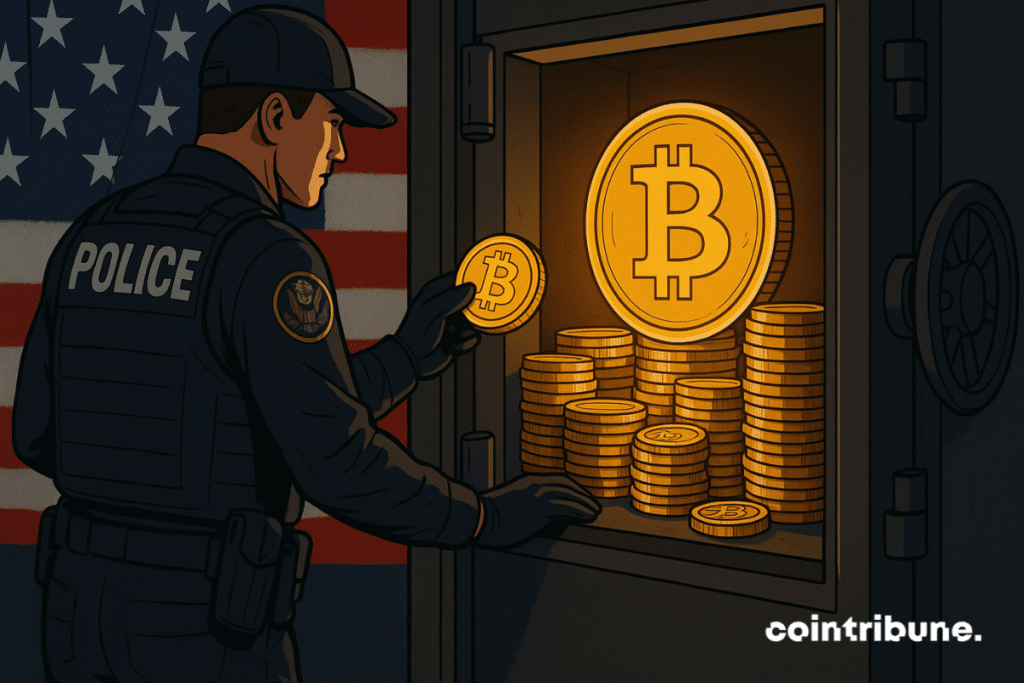The USA Seizes Billions in Bitcoin: Will They Fuel Their Strategic Reserve?
The US Department of Justice has just made the largest bitcoin seizure in its history. This digital fortune now triggers an intense political debate: should victims be compensated or should the national strategic reserve be strengthened?

In brief
- The US government seized 14.4 billion dollars in bitcoin from Chen Zhi, alleged leader of a vast crypto scam network based in Cambodia.
- This record confiscation brings the government’s total holdings to about 36 billion dollars in Bitcoin, according to estimates.
- Senator Cynthia Lummis advocates for these funds to directly feed the national bitcoin strategic reserve desired by Trump.
- Scam victims may have to wait years before being compensated, due to the complexity of the international laundering network.
A record seizure that revives the debate on the Bitcoin reserve
US authorities have seized 127,271 bitcoins belonging to Chen Zhi, founder of the Prince Holding Group.
Accused of electronic fraud and money laundering, this Cambodian businessman would have orchestrated a global crypto scam. Prosecutors are now seeking the permanent confiscation of his digital assets.
This spectacular seizure comes as the Trump administration launched last March the initiative for a bitcoin strategic reserve. The presidential decree instructed the Treasury Department to assess the cryptocurrencies already held by the government. However, no official figures have been communicated to date, despite deadlines set for April and May.
According to Arkham Intelligence, government wallets would contain about 22 billion dollars in Bitcoin. Adding the freshly seized 14.4 billion would bring this amount to more than 36 billion dollars. A digital war chest that fuels political covetousness.
A legal puzzle with major strategic implications
Republican Senator Cynthia Lummis does not hide her ambitions. “Transforming crime proceeds into assets that strengthen America’s Bitcoin strategic reserve shows how prudent policy can turn a reprehensible act into lasting national value“, she declared.
Her bill plans for the federal government to purchase over 100 billion dollars in Bitcoin.
The growing interest of states in bitcoin is part of a broader trend. Ryan Lee, chief analyst at Bitget, notes that “Bitcoin is increasingly behaving like “digital gold,” reflecting the characteristics of a safe haven value in times of geopolitical turmoil“. This structural evolution enhances the institutional appeal of crypto as a neutral reserve asset.
But this vision clashes with a complex legal reality. Scott Johnsson, a lawyer specializing in crypto finance, forecasts a “multi-year” process to unravel the international laundering network and verify compensation claims.
Victims, scattered across dozens of countries, will have to prove their losses. Ari Redbord, former federal prosecutor, qualifies the issue as “really difficult”.
The silence of the Treasury Department and the White House on the intended use of these funds reflects the administration’s embarrassment. Should justice for victims or strategic opportunity be prioritized? Washington will have to decide.
This case crystallizes tensions between financial pragmatism and moral obligations. As Bitcoin establishes itself as a strategic asset, the United States faces an unprecedented dilemma: to repay those who suffered or to build a new financial arsenal for the 21st century.
Maximize your Cointribune experience with our "Read to Earn" program! For every article you read, earn points and access exclusive rewards. Sign up now and start earning benefits.
Passionné par le Bitcoin, j'aime explorer les méandres de la blockchain et des cryptos et je partage mes découvertes avec la communauté. Mon rêve est de vivre dans un monde où la vie privée et la liberté financière sont garanties pour tous, et je crois fermement que Bitcoin est l'outil qui peut rendre cela possible.
The views, thoughts, and opinions expressed in this article belong solely to the author, and should not be taken as investment advice. Do your own research before taking any investment decisions.